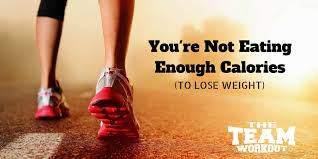
Could something as simple as under-eating be causing your health problems? Could inadequate food intake be the reason why your Paleo diet suddenly isn’t working for you anymore? Is your “rapid weight loss” diet plan the reason your jeans are getting tighter instead of looser?
While a slight caloric deficit can lead to sustainable weight loss (think 300-500 calories per day), much larger deficits induce changes in your body’s metabolism in order to keep your body in a homeostatic balance. Your body does not like major, drastic changes, and it will make modifications to your thyroid, adrenal, and sex hormones in order to reduce your overall caloric output.
This includes reducing active thyroid hormone, shutting down sex hormone production, and raising stress hormones like cortisol. Chronically elevated cortisol leads to both leptin and insulin resistance, a disastrous hormonal state that can keep body weight high.
These hormonal changes can lead to stalled weight loss and body fat retention, along with many other negative health effects that go beyond weight loss resistance. Under-eating can easily cause hypoglycemia, especially when combined with exercise. And because many people feel better eating sugary foods when they’re hypoglycemic, this can lead to the common cycle of high and low blood sugar swings that cause chronic dieters to overeat or binge on junk foods.
Hypoglycemia is defined as blood sugar below 70 mg/dL, though some people experience symptoms at higher blood sugar levels. Common symptoms include hunger, shakiness, anxiety, dizziness, sweating, weakness, confusion, and changes in mood.
HOW MANY CALORIES DO I NEED TO EAT A DAY TO LOSE WEIGHT
An average woman needs to eat about 2000 calories per day to maintain, and 1500 calories to lose one pound of weight per week. An average man needs 2500 calories to maintain, and 2000 to lose one pound of weight per week.
However, this depends on numerous factors. These include age, height, current weight, activity levels, metabolic health and several others.
